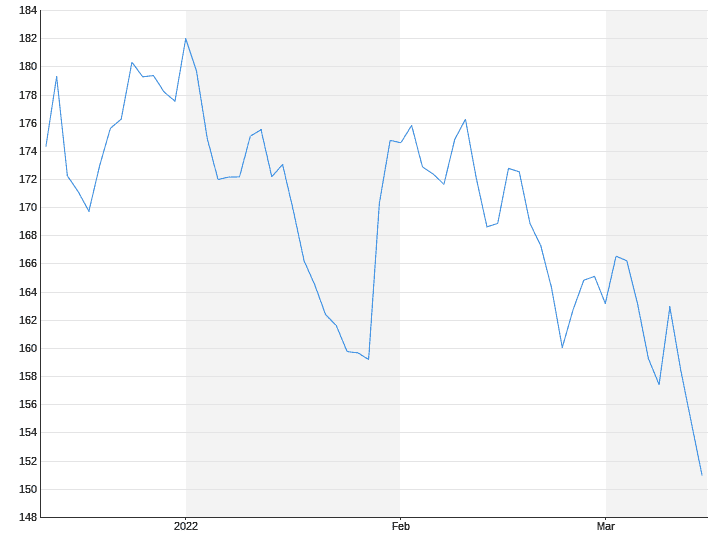Dow Jones is barely moving
Investors lose courage again
03/14/2022, 9:45 p.m
Investors on Wall Street remain cautious despite efforts to find a diplomatic solution to the Ukraine war. Safe havens were not in demand despite the subdued mood. Among the individual stocks, Apple fell 2.7 percent. Shares in Chinese companies were sold heavily.
After a volatile course, the US stock exchanges finally tended towards weakness. In the meantime, the mood has brightened somewhat, as the fourth round of negotiations between Ukraine and Russia is scheduled to continue on Tuesday. This fact alone raised hopes on the market, despite the fact that the Russian invading troops continued their attacks on major Ukrainian cities incessantly. As a result, investors lost courage over the course of the year, and prices came back.
“We see that the Ukraine war is reducing global growth, increasing inflation and putting central banks in a bind,” said BlackRock Investment Institute market strategist Alex Brazier. the Dow Jones Index closed little changed at 32,945 points from a daily high of 33,396 points, while the S&P 500 and Nasdaq Composite fell 0.7 and 2 percent, respectively.
The courses moved in the tension of the Ukraine war and new Covid 19 outbreaks, especially in China. New pandemic-related production interruptions in China slowed down the technology sector in particular, which also faced headwind from significantly higher market interest rates. Because in addition to the general political climate, investors looked at the US central bank meeting, which will announce the result of its deliberations on Wednesday evening (CET).
Safe havens not asked
The market is widely expecting the Fed to hike rates for the first time since 2018. A rate hike of 25 basis points is considered priced in. A hike of 50 basis points, on the other hand, is probably off the table, analyst Jeffrey Halley from Oanda suspected. On the other hand, it cannot be ruled out that the Fed will increase the pace of its interest rate hikes in order to combat inflation, which is at its highest level for 40 years.
The topic of corona came to the fore again after new lockdowns were ordered in some cities in China due to the increasing number of cases. The port city and economic metropolis of Shenzhen was also affected. Should the port there be closed again due to the pandemic, the supply chain problems threaten to worsen, as Halley noted.
Safe havens were not in demand despite the rather subdued mood on the stock market. The dollar weakened, as did the yen and Swiss franc. The dollar index fell 0.1 percent. With the prospect of rising key interest rates, yields on the bond market continued to rise rapidly, and the paper was thus handed over. The 10-year US Treasury yield climbed to a three-year high. Gold was also sold – burdened by significantly higher market interest rates.
Shares in Chinese companies sold off sharply
the oil prices came under significant pressure. Here, speculation about falling demand from China as a result of the corona pandemic wave there had a negative impact. In addition, Russia continues to supply oil and gas to countries classified as “unfriendly”. And the nuclear deal with Iran isn’t dead either, despite the recent missile attack on Iraq, a trader said. This could lead to further offers on the market. There were also reports that additional oil could also come onto the market from Venezuela – US sanctions could be lifted.

Among the individual values fell Apple by 2.7 percent. The Taiwanese supplier Foxconn had temporarily closed two plants in Shenzhen due to the lockdown. In contrast, the papers of the corona vaccine manufacturers drew Biontech and Moderna by 12 or 8.6 percent. “The pandemic may have faded into the background in the media, but it continues to rage,” said one market participant, also with a view to China. Pfizer gained 3.9 percent. The titles of the electric car manufacturer Tesla fell 3.6 percent. In the trade, reference was made to statements by Elon Musk. The company’s founder and CEO saw significant inflationary pressures on Tesla.
Shares in Chinese companies were also sold heavily. Alibaba down 10.3, bilibili at 10.8, JD.com at 10.5, pinduoduo at 20.5 and Xpeng by 13.8 percent. In addition to the corona situation in China, the US authorities threatened to delist Chinese companies in the US if they did not comply with the accounting regulations applicable there.
